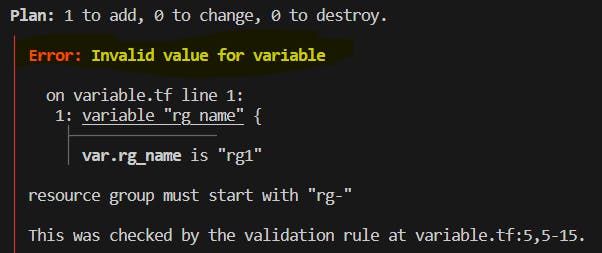Terraform in details
Here we can go through terraform features and other aspects of terraform
Terraform variables validation
we have applied the validation parameter for the resource group name, if the given name won't meet the desired conditions it will through error.
variable "rg_name" {
type = string
default = "rg-13"
validation {
condition = length(var.rg_name) > 3 && substr(var.rg_name, 0, 3) == "rg-"
error_message = "resource group must start with \"rg-\" "
}
}
when you try to run terraform plan
terraform plan -out tfplan -var rg_name="tfrg"
Error:

Lifecycle rules:
create_before_destroy:
Using lifecycle rules in terraform you can control how terraform create and destroy resources.
suppose you changes vm image which eventually delete the old resource and create a new one. by using lifecycle rules you can define how to control this
resource "azurerm_resource_group" "example" {
# ...
lifecycle {
create_before_destroy = true
}
}
Now when you run terraform apply command, the new resource will be created first and then the old resource will be deleted.
Prevent destroy:
If you don’t want to destroy the resource you can specify as below:
resource "azurerm_resource_group" "example" {
# ...
lifecycle {
prevent_destroy = true
}
}
here terraform avoid to delete the resource and this can help you when someone accidentally delete any resource especially databases.
This property doesn’t make resources immune to the terraform destroy command. It will only prevent resource deletion from changes made to the configuration file and subsequent terraform apply.
Ignore Changes:
This rule will prevent a resource from being updated based on a list of attributes we defined inside the life cycle block
suppose a tag got changes by someone but this change has no much impact on the resource so this change can be ignored.
also you can use ignore_changes = all if you don’t want the resource to be modified for any changes.
resource "aws_instance" "example" {
# ...
lifecycle {
ignore_changes = [
# Ignore changes to tags, e.g. because a management agent
# updates these based on some ruleset managed elsewhere.
tags,
]
}
}